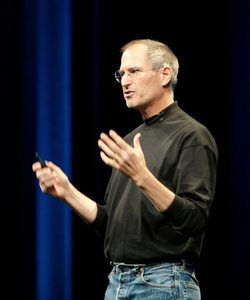
From an interview with Steve Jobs, December 19, 1991, in Redwood City, California.
Here Jobs talks about motivation and criticism.
STEVE JOBS: . . . I think most people that are able to make a sustained contribution over time - - rather than just a peak -- are very internally driven. You have to be. Because, in the ebb and tide of people's opinions and of fads, there are going to be times when you are criticized, and criticism's very difficult. And so when you're criticized, you learn to pull back a little and listen to your own drummer. And to some extent, that isolates you from the praise, if you eventually get it, too. The praise becomes a little less important to you, and the criticism becomes a little less important to you, in the same measure. And you become more internally driven.
My take-aways:
1. I agree with Jobs that most highly successful people, defined by fame and fortune, are probably more internally motivated than externally motivated. They have something deep inside that energizes, directs, and sustains their behavior, enabling them to face adversity and external criticism. The balance though between valuing legitimate, useful criticism and rejecting same can be difficult. We all need an honest "sounding board," someone who will tell it to us as it is, from another pair of eyes. The higher one goes, the more difficult this becomes. Kaplan, Drath, and Kofodimos (1987), studying executive self-development, found that executives at the top of organizations tended to be isolated and not likely to receive useful criticism about their performance.
2. Steve Jobs underscored the power of intrinsic motivation. In Boston last August I listened to Vic Vroom talk about his career and his expectancy theory (in my opinion the most practical motivational theory). He said that if he were developing expectancy theory today, he would give more thought to intrinsic rewards. For managers, it is easier to manage extrinsic motivational factors (pay, benefits, etc.) than intrinsic factors (job satisfaction, feeling of accomplishment, meaningfulness of work, etc.). But sometimes the most valued outcomes may be intrinsic. A simple “great job” may make someone's day.
Kaplan, R. E., Drath, W. H., & Kofodimos, J. R. (1987). High hurdles: the challenge of executive self-development. The Academy of Management Executive, 1 (3), 195-205.
Image by acaben on Flickr. Permission to share http://creativecommons.org/licenses/by-sa/2.0/
 RSS Feed
RSS Feed